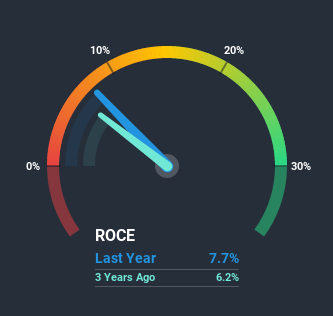
Finding a business that has the potential to grow substantially is not easy, but it is possible if we look at a few key financial metrics. One common approach is to try and find a company with returns on capital employed (ROCE) that are increasing, in conjunction with a growing amount of capital employed. If you see this, it typically means it's a company with a great business model and plenty of profitable reinvestment opportunities. However, after investigating HeidelbergCement (ETR:HEI), we don't think it's current trends fit the mold of a multi-bagger.
Return On Capital Employed (ROCE): What is it?
For those that aren't sure what ROCE is, it measures the amount of pre-tax profits a company can generate from the capital employed in its business. The formula for this calculation on HeidelbergCement is:
Return on Capital Employed = Earnings Before Interest and Tax (EBIT) ÷ (Total Assets - Current Liabilities)
0.077 = €2.0b ÷ (€32b - €5.9b) (Based on the trailing twelve months to December 2020).
Thus, HeidelbergCement has an ROCE of 7.7%. Even though it's in line with the industry average of 7.8%, it's still a low return by itself.
See our latest analysis for HeidelbergCement

In the above chart we have measured HeidelbergCement's prior ROCE against its prior performance, but the future is arguably more important. If you'd like to see what analysts are forecasting going forward, you should check out our free report for HeidelbergCement.
What The Trend Of ROCE Can Tell Us
Things have been pretty stable at HeidelbergCement, with its capital employed and returns on that capital staying somewhat the same for the last five years. It's not uncommon to see this when looking at a mature and stable business that isn't re-investing its earnings because it has likely passed that phase of the business cycle. So unless we see a substantial change at HeidelbergCement in terms of ROCE and additional investments being made, we wouldn't hold our breath on it being a multi-bagger. This probably explains why HeidelbergCement is paying out 33% of its income to shareholders in the form of dividends. Given the business isn't reinvesting in itself, it makes sense to distribute a portion of earnings among shareholders.
What We Can Learn From HeidelbergCement's ROCE
In summary, HeidelbergCement isn't compounding its earnings but is generating stable returns on the same amount of capital employed. And investors may be recognizing these trends since the stock has only returned a total of 8.7% to shareholders over the last five years. So if you're looking for a multi-bagger, the underlying trends indicate you may have better chances elsewhere.
Since virtually every company faces some risks, it's worth knowing what they are, and we've spotted 2 warning signs for HeidelbergCement (of which 1 makes us a bit uncomfortable!) that you should know about.
For those who like to invest in solid companies, check out this free list of companies with solid balance sheets and high returns on equity.
When trading HeidelbergCement or any other investment, use the platform considered by many to be the Professional's Gateway to the Worlds Market, Interactive Brokers. You get the lowest-cost* trading on stocks, options, futures, forex, bonds and funds worldwide from a single integrated account. Promoted
Valuation is complex, but we're here to simplify it.
Discover if Heidelberg Materials might be undervalued or overvalued with our detailed analysis, featuring fair value estimates, potential risks, dividends, insider trades, and its financial condition.
Access Free AnalysisThis article by Simply Wall St is general in nature. It does not constitute a recommendation to buy or sell any stock, and does not take account of your objectives, or your financial situation. We aim to bring you long-term focused analysis driven by fundamental data. Note that our analysis may not factor in the latest price-sensitive company announcements or qualitative material. Simply Wall St has no position in any stocks mentioned.
*Interactive Brokers Rated Lowest Cost Broker by StockBrokers.com Annual Online Review 2020
Have feedback on this article? Concerned about the content? Get in touch with us directly. Alternatively, email editorial-team (at) simplywallst.com.
About XTRA:HEI
Heidelberg Materials
Produces and distributes cement, aggregates, ready-mixed concrete, and asphalt worldwide.
Excellent balance sheet, good value and pays a dividend.
Similar Companies
Market Insights
Community Narratives



